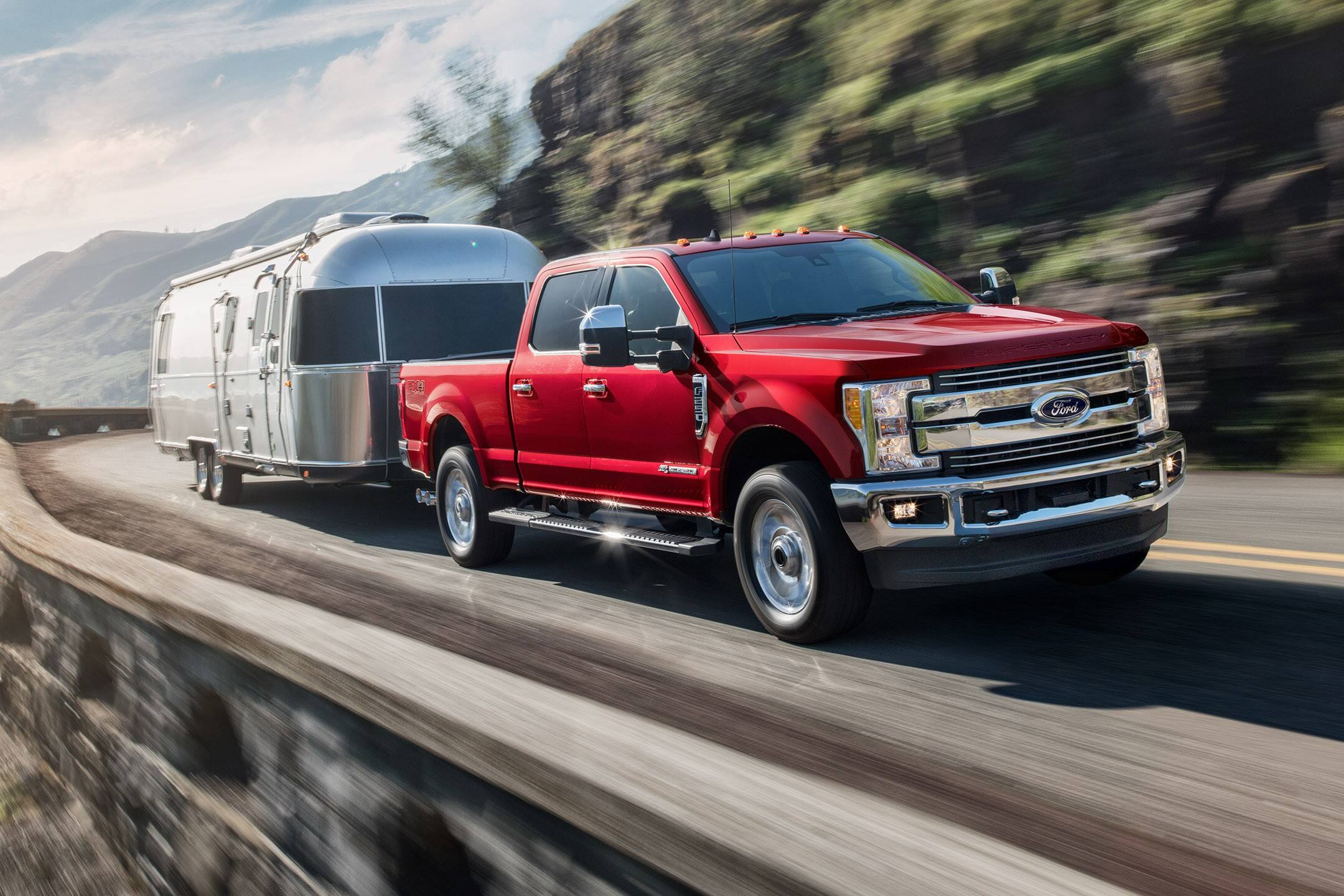Photo: a 2019 Ford F-250 towing an Airstream trailer | Courtesy Ford Motor Company
By Jason Epperson
One of the most common questions people have when they’re about to buy an RV (or a truck to pull one) is whether or not to get a diesel. Hands down, a diesel is “better” if your definition is more power and more durability, but you have to weigh the cost against the benefits. On a 2019 Ford Super Duty (F-250 & F-350) the upgrade from the 6.2L gasoline engine to the 6.7L Power Stroke turbo diesel is $9,120. And the current national average has diesel fuel up $0.28 over gasoline.
Of course, if you ask most diesel owners, they’re going to tell you it’s absolutely worth it. If you ask most gasoline engine owners, they’ll say they get by just fine with a fatter bank account. And it’s nearly impossible to tell you with 100% certainty which engine is right for you. Instead, let’s consider the pros and cons of each.
Fuel efficiency
Diesel engines are more efficient—meaning a gallon of diesel delivers about 12% more energy than a gallon of gasoline. That difference is magnified on long highway hauls and reduced in stop-and-go traffic.
But at the moment, diesel fuel is about 10% more expensive than regular gasoline, and that number fluctuates. Some gassers want you to put the good stuff in, though. If the gas engine demands premium fuel, the edge goes to the diesel. But is it an edge worth $10,000? Probably not. If you put 15,000 miles on your vehicle, you’ll save about $400 per year.
DEF Fluid
All modern diesels require Diesel Exhaust Fluid, which, for that same 15,000 miles per year will run you $250-$300. So now, that $400 savings is cut to $100-$150. And if the gasser can run on regular instead of premium, it’s now clearly in the win category…
Weight and Towing
….sort of. Fuel efficiency is way more complicated than just a simple equation. Diesel engines care a lot less about weight than gasoline engines. Meaning that if you add a trailer into the mix, the gasoline-powered truck will lose a greater percentage of fuel efficiency than the diesel. Similarly, on steep grades, diesels will care a bit less. How much? Impossible to say. There are too many variables. But diesels certainly outshine gassers when hauling heavy loads (including their own weight if it’s a motorhome). The bigger the RV, the more efficient it is to have a diesel.
There’s a whole lot of extra low-end torque on a diesel, too. Meaning that you’ll be a lot more comfortable pulling a big RV up a grade, or even just out of a campsite.
Exhaust Brakes
Diesel engines can (but don’t always) incorporate an exhaust brake, which helps control the vehicle on steep grades without wearing on the wheel brakes. It’s a huge advantage for towing big rigs on mountain passes.
Range
Even though diesel fuel is more expensive, the same number of gallons are going to get you further, meaning a few less fill-ups.
Maintenance and Cost to repair
Overall, regular diesel maintenance is a bit cheaper, but repairs are more expensive. Oil usually only needs to be changed once a year. There are no spark plugs or wires. And since diesel engines have fewer problems than gas engines, you’re likely to have fewer repairs. But those repairs, when they do happen, are much more expensive on a diesel—especially those with modern emissions systems.
Useful Life
A good diesel engine may last 300,000 to 500,000 miles or more before a re-build is necessary. Gasoline engines are more likely to clunk out between 150,000 and 200,000. Most motorhomes are never driven anywhere near this many miles, but it’s an essential consideration for a pick-up truck.
Resale Value
That engine life means diesel engines hold their value longer. That’s why many diesel trucks that are 15 years old are still worth well over $20,000.
Fuel Accessibility
You might think diesel is more difficult to come by, making this category a “win” for gassers, but the problem arises when you try to pull a long rig into a standard gas station fuel island. It’s a big challenge for many, especially if they are towing. Diesel owners can use the truck pumps at a truck stop, and even the smaller rural stations often have the diesel pump off to the side for easier access.
The Bottom Line
A diesel gets better fuel economy than a comparable gas engine, but once you factor in the fuel price difference it’s pretty much a wash. Diesel engines last longer, but again, they cost more both to buy and repair.
In the end, experts say that total cost of ownership of a diesel is a bit less than a gasser, but to enjoy that benefit, you have to be able to afford the up-front purchase. And I’m not sure that those doing the analyzing are considering the interest on the extra $9000 financed.
Our opinion is that diesel is not required for light trailers/small motorhomes, it’s helpful for mid-weights if you can afford it, and it’s required for the heaviest RVs.








